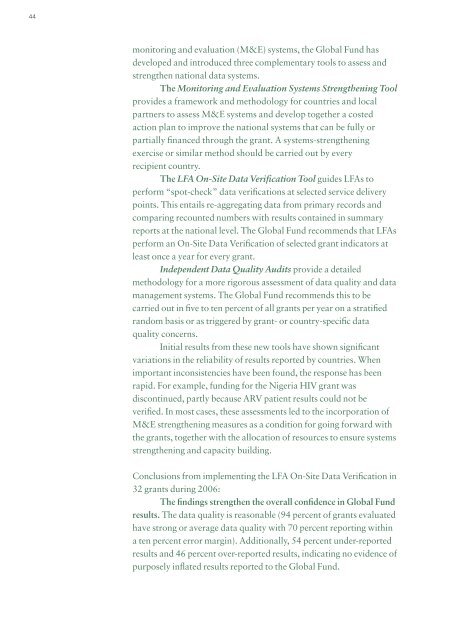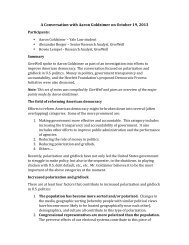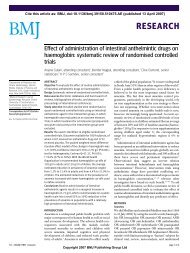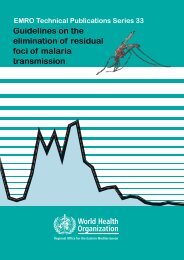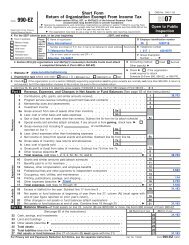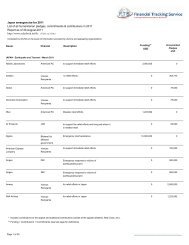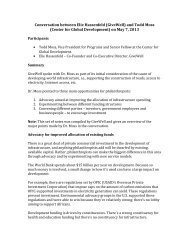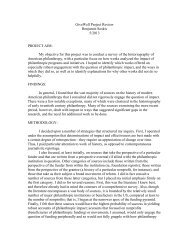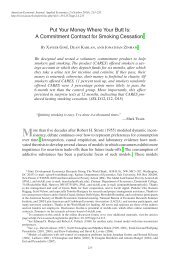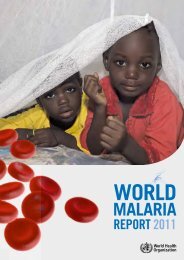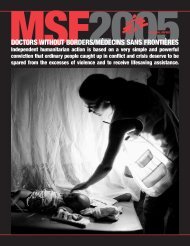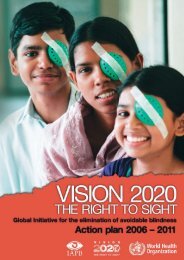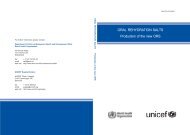Annual Report 2006 - The Global Fund
Annual Report 2006 - The Global Fund
Annual Report 2006 - The Global Fund
- No tags were found...
You also want an ePaper? Increase the reach of your titles
YUMPU automatically turns print PDFs into web optimized ePapers that Google loves.
44<br />
monitoring and evaluation (M&E) systems, the <strong>Global</strong> <strong>Fund</strong> has<br />
developed and introduced three complementary tools to assess and<br />
strengthen national data systems.<br />
<strong>The</strong> Monitoring and Evaluation Systems Strengthening Tool<br />
provides a framework and methodology for countries and local<br />
partners to assess M&E systems and develop together a costed<br />
action plan to improve the national systems that can be fully or<br />
partially financed through the grant. A systems-strengthening<br />
exercise or similar method should be carried out by every<br />
recipient country.<br />
<strong>The</strong> LFA On-Site Data Verification Tool guides LFAs to<br />
perform “spot-check” data verifications at selected service delivery<br />
points. This entails re-aggregating data from primary records and<br />
comparing recounted numbers with results contained in summary<br />
reports at the national level. <strong>The</strong> <strong>Global</strong> <strong>Fund</strong> recommends that LFAs<br />
perform an On-Site Data Verification of selected grant indicators at<br />
least once a year for every grant.<br />
Independent Data Quality Audits provide a detailed<br />
methodology for a more rigorous assessment of data quality and data<br />
management systems. <strong>The</strong> <strong>Global</strong> <strong>Fund</strong> recommends this to be<br />
carried out in five to ten percent of all grants per year on a stratified<br />
random basis or as triggered by grant- or country-specific data<br />
quality concerns.<br />
Initial results from these new tools have shown significant<br />
variations in the reliability of results reported by countries. When<br />
important inconsistencies have been found, the response has been<br />
rapid. For example, funding for the Nigeria HIV grant was<br />
discontinued, partly because ARV patient results could not be<br />
verified. In most cases, these assessments led to the incorporation of<br />
M&E strengthening measures as a condition for going forward with<br />
the grants, together with the allocation of resources to ensure systems<br />
strengthening and capacity building.<br />
Conclusions from implementing the LFA On-Site Data Verification in<br />
32 grants during <strong>2006</strong>:<br />
<strong>The</strong> findings strengthen the overall confidence in <strong>Global</strong> <strong>Fund</strong><br />
results. <strong>The</strong> data quality is reasonable (94 percent of grants evaluated<br />
have strong or average data quality with 70 percent reporting within<br />
a ten percent error margin). Additionally, 54 percent under-reported<br />
results and 46 percent over-reported results, indicating no evidence of<br />
purposely inflated results reported to the <strong>Global</strong> <strong>Fund</strong>.


